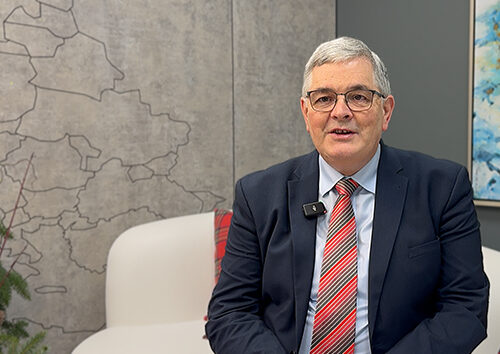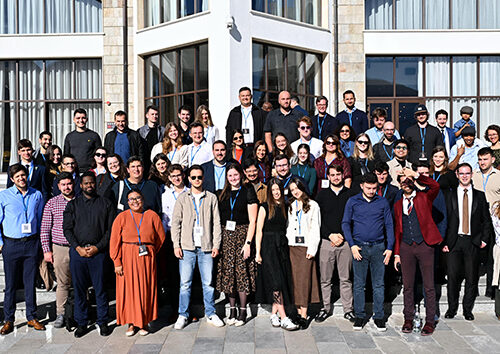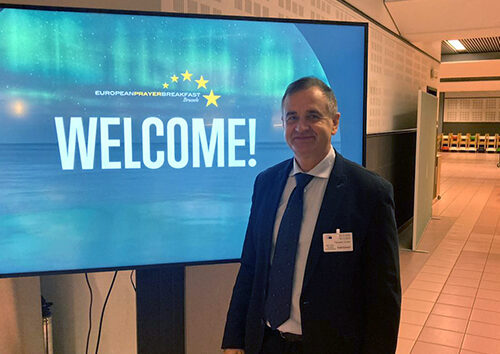19 April 2021 | Binfield, UK [Helen Pearson] As the world tries slowly to emerge from the pandemic, the Newbold Diversity lecture for April focused on an even more urgent and serious problem – climate change. Where should we now look for leadership on the challenges presented by our environment?
María Alejandra Andrade Vinueza (María Andrade) was the right person to offer many answers to that question in surprising places. Andrade is an Ecuadorian theologian and sociologist who works for the evangelical charity, TEAR Fund, as Global Theology and Network Engagement Team Leader. Speaking about her work live from her home in locked-down Quito, she offered what the Q&A session showed were new insights for many audience members.
Setting the tone for her lecture, she pointed out that the name of her continent is itself a colonialist construct. The name South America was imposed on the country by colonial powers bent on plundering the rich resources of minerals – especially gold and silver – from an area of the world originally known as Abya Yala or ‘Mature Land’ in ‘Guna’, an indigenous language.
A reminder of the shocking climate change facts put the rest of the lecture in context: the increase in carbon dioxide, the threats of droughts, flooding, hurricanes and rising sea levels in the countries and communities who have done the least to cause the problem. If we don’t limit warming, 100 million more people could be living in extreme poverty by 2030. (World Bank figures)
Andrade went on to outline what she called the historical root causes of climate change in ‘500 years of systematic looting’ of ‘Abya Yala’. The eye-watering statistics about the 16th century genocide of 56 of the 60 million people in the land, the extraction of gold and silver – in an insatiable thirst for wealth for European dynasties, made difficult listening. Later, during the Industrial Revolution, the ‘colonies became the primary suppliers of raw material’. The traditional agricultural crops for indigenous diets were replaced by sugar cane, rubber, coffee, and cocoa for export to Europe. The continuing exploitation includes contamination of rivers and seas and pollution of the air, all exacerbating climate change.
The impoverished people whose land has been systematically exhausted and destroyed play a major part in fighting against climate change. And their work is costing human lives. Andrade showed statistics for 2019 when almost 200 climate leaders were killed in ten countries, most of them in Latin America. While the murder of ‘earth defenders’ increases, the remaining indigenous peoples continue to contend with abuse, intimidation, bullying, coercion, illegal accusations and restrictions of their rights. These come not only from multi-national corporations, drug cartels and other illegal and trafficking organisations. Their own governments put lives and livelihoods at risk by entering into contracts with foreign companies still continuing the hunt for natural resources like logs, oil, gems and metal. They permit hydro-electric projects which pollute the water with cadmium, lead and arsenic.
Indigenous peoples like the Sarayaku community in Ecuador defend their land with wit and wisdom. Andrade described how they campaigned physically in camps on the borders of their land and also sued and won a case against the Ecuadorian government for destroying their livelihoods and putting their lives at risk. With first-hand video narratives she showed how central to this work is the role of indigenous women who nurture the crops, preserve culture, wisdom and stories, organising their communities to struggle for survival against the odds.
The scientific and spiritual arguments that the indigenous peoples use offer insights into their ways of thinking about the world and inspiration for those outside their communities. They contend that their territory is a carbon sink which absorbs high amounts of carbon dioxide which mitigates the worst effects of climate change. Spiritually they stress their ‘cosmo vision’ – the existence of a wholistic eco-system and shared well-being. If humans care for the world, the world will care for us. They fight for the land because ‘the land is us’. Predictably but sadly, their poverty and the racist attitudes in the wider world mean that their lives are undervalued.
Finally, Andrade explored ways for all of us to ‘move from ego to eco,’ by changing our mindsets and lifestyles. We need to learn what is really happening in the world. As Christians, we need to understand that sin is individual but also systemic, social and structural. It needs to be challenged, denounced and corrected. Not only do we need to raise our voices, sign petitions, support the defenders, but we need to examine our theologies. We need to challenge those anti-ecological theologies which have seen human beings as dominant and allowed us to exploit the land rather than to care for the land. As we look for alternative ways of living to help us fight against climate change, we can learn from the rich culture and belief of the indigenous communities.
Andrade concluded with a prayer ‘that we shall see the face of God in the faces of the indigenous people who are fighting with their bodies, their blood and their life for our earth’.
The lecture and the Q&A which followed can be seen in full here.
tedNEWS Staff: Victor Hulbert, editor; Deana Stojković, associate editor
119 St Peter’s Street, St Albans, Herts, AL1 3EY, England
E-mail: [email protected]
Website: www.ted.adventist.org
tedNEWS is an information bulletin issued by the communication department of the Seventh-day Adventist Church in the Trans-European Division. Readers are free to republish or share this article with appropriate credit including an active hyperlink to the original article.



